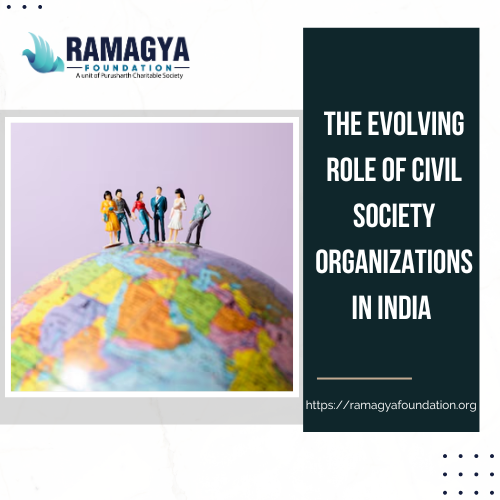Organizations from civil society are essential to the development of societies. These groups played a crucial role in India’s endeavors to address political, social, and economic concerns. Their functions and effects have changed over time to correspond with shifts in the sociopolitical landscape of India.
This blog examines the development of CSOs, their function today, difficulties they face, and potential directions for the future. The role of civil society has been very crucial in our India.
Historical Context
In India, the concept of civil societies is deeply rooted within its history. Prior to independence, social reform groups such as those led by Raja Ram Mohan Roy and Swami Vivekananda initially engaged civil society. Social ills like untouchability and caste prejudice were the focus of these protests.
Throughout the Nehruvian era after independence, the state took the lead in growth, providing limited room for non-state actors. The emergence of neighborhood organizations like the Chipko Movement, which promoted environmental consciousness, brought about a huge shift in the 1970s. This period laid the groundwork for the CSO landscape of modern India. Role of civil society has been very significant for India since the beginning.
The role of civil society organizations
- Advocacy & Policy Influence: CSOs play a key role in influencing legislation and pushing for policy changes. The National Rural Employment Guarantee Act and the Right to Information Act were greatly influenced by CSOs.
- Service Delivery: Where the government falls short, a lot of CSOs concentrate on offering vital services. These consist of cleanliness, healthcare, and education. Organizations that have significantly impacted these industries include SEWA and Pratham (the Self Employed Women’s Association).
- Awareness & Capacity-Building: CSOs are crucial in raising public awareness of social issues, and building local community capacity. They run training programs, workshops and awareness campaigns in order to inform people of their rights and responsibilities.
- Accountability and Transparency: CSOs act as watchdogs to ensure accountability and transparency of government functions. They monitor policies and programs and highlight corruption and inefficiency.
- Human Rights Protection: CSOs are leading the way in India when it comes to defending human rights. They defend the rights of underprivileged populations, including Dalits, Adivasis, women, and children. Human Rights Watch India, Amnesty International India, and other groups are involved in this.
Challenges faced:
Despite their important contributions, CSOs face several challenges in India:
- Regulatory Hurdle: CSOs are often faced with complex regulatory frameworks, bureaucratic red tape and other obstacles. Foreign Contribution (Regulation) Act (FCRA) has been one of the regulations that have made it difficult for CSOs to access foreign funds.
- Funding constraints: Finding adequate funding is an ongoing challenge for many CSOs. Financial instability can result from a dependence on both national and international donor funding. There is also competition among many organizations for limited resources.
- Political Pressure: CSOs are sometimes subject to political pressure, and even backlash when perceived as being critical of the Government. This can result in harassment, intimidation and even legal actions against activists and organizations.
- Capacity issues: Many CSOs struggle with capacity problems, such as lack of qualified personnel, inadequate infrastructure and limited access technology and resources.
- Public Perception: There is a general lack of understanding and awareness among the public regarding the role and importance of CSOs. The negative perceptions fueled by reports of corruption or inefficiency within certain organizations can damage their credibility.
Success Stories
- The Polio Eradication Campaign: The government, civil society organizations, and international organizations worked together to successfully eradicate polio in India. In rural and underdeveloped areas, CSOs were important in rallying communities, raising awareness, and guaranteeing vaccine coverage.
- The Right to Schooling Act: This law, which requires free and compulsory schooling for children between the ages of six and fourteen, was greatly influenced by the campaigning efforts of CSOs. The Annual Status of Education Report and ASER, among other organizations, have been instrumental in drawing attention to this legislation and overseeing its execution.
- Women’s Empowerment: Organizations like SEWA play a key role in empowering women, particularly in the informal sector. SEWA’s efforts to organize women workers, offer them financial services and advocate their rights have had a profound impact on the socioeconomic status of Indian women.
The Way Forward
In order to improve their impact and overcome challenges, CSOs need to concentrate on several key areas.
- Strengthening capacity: It is important to build the CSOs’ capacities through training, skills development and resources. It includes improving their abilities to manage projects efficiently and use technology effectively. They will also be able to engage constructively with stakeholder groups.
- Collaboration: CSOs can achieve more sustainable solutions by working together with other stakeholders, including the private sector, government and academia. By leveraging complementary strengths and resources, partnerships can reduce duplication.
- Transparency and Accountability: CSOs must strive for high standards of accountability, and transparency. This includes adopting best practices in governance, financial reporting and management.
- Engaging Public: It is important to increase public awareness of CSOs and their impact. Effective communication strategies, engagement of the community, and sharing success stories can help achieve this.
- 5. Advocating Enabling Policy: CSOs must continue to advocate policies that foster an environment conducive to their operation. It includes the simplification of regulatory structures, ensuring funding and protecting civil society actors’ rights.
Conclusion
CSOs are crucial to India’s development as it continues to grow. They will continue to be a driving force in inclusive and sustainable growth, addressing new challenges.
CSOs’ future in India depends on their ability to adapt and leverage technology. They also need to build strong collaboration networks. They can be powerful change agents, creating a society that is more equitable, just and prosperous for everyone.
